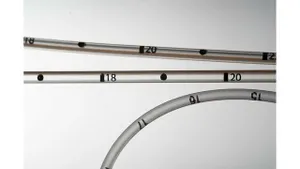Bioresins bloom at K
October 1, 2007
Bioresins continue to branch out from polyolefin-style polymers and packaging into new resins, applications, and feedstocks, with multiple companies making announcements at the K Show for partially biobased thermoplastic elastomers (TPE), thermoplastic polyurethanes (TPU), and polyamides (PA). Merquinsa (Stand 7.1/E06), Arkema (Stand 6/C57), BASF (Stand 5/B21), and DuPont (Stand 6/D27) have launched or expanded new materials that range in renewable content from 40% to 100% by weight.
For its partially biobased resin, BASF went back 50 years to retool a castor-oil technology and create Ultramid Balance PA 6.10. The material is based 60% on castor-oil-derived sebacic acid and offers low density for a PA, low-temperature impact resistance, and great dimensional stability due to low water absorption. BASF subsidiary Elastogran already launched its new polyol Lupranol Balance 50 slabstock foam material.
DuPont launched Hytrel TPE, Zytel long-chain PA, Biomax RS polytrimethylene terephthalate (PTT), Hytrel RS TPE, DuPont Selar VP breathable films, and Sorona EP, which is similar to polybutylene terephthalate (PBT). These apply bio-based 1,3 propanediol created at DuPont’s Loudon, TN joint venture with Tate & Lyle Bio Products.
The new renewably sourced grades of Zytel long-chain polyamides are also based on sebacic acid from castor oil. PA 1010 is 100% renewably sourced and PA 610 is more than 60% renewably sourced. These flexible PAs are used where temperature resistance, low permeability, or mechanical properties are important. Part of the family is already commercially available with additional grades to be introduced in 2008.
Merquinsa (07.1 E06) announced what it describes as the industry’s first TPUs and adhesive product lines made with renewable sources. Merquinsa Pearlthane and Pearlbond ECO grades are made from 40% to 95% (by weight) renewable resources, respectively. These new product lines utilize a proprietary technology and reportedly boast performance that’s equal to, or in some cases, even better than traditional petroleum-based TPU products.
Merquinsa’s ECO serves a diverse portfolio of end-use products that range from consumer electronics, footwear, adhesives, industrial, automotive, and sports and leisure applications. These new grades will be commercialized globally in the coming months, and a full life-cycle assessment (LCA) is underway with a certified organization to provide full environmental data.
Arkema (06 C57), meanwhile, introduced two of its own new products at K based on vegetable castor oil. Pebax Rnew TPEs are said to feature the same performance as petroleum-derived Pebax TPEs, while Platamid Rnew thermoplastic hotmelt adhesives also bring efficient solutions to the most demanding, bonding challenges. Arkema has leveraged its expertise in renewable-based Rilsan of polyamide 11 to develop the products. Arkema’s renewable-based product portfolio is developed and marketed under the Renewables label, which will apply to products involving at least 20% renewable origin.
On the 100%-biobased front, Novamont (Stand 6/E9) launched a Mater-Bi Nanostarch it says can improve performance in flexible films. The company also announced the expansion of manufacturing capacity at its Terni biorefinery to 60,000 tons of material in 2008. Attending its first K, Metabolix (Stand 5/G19-9), announced the award of a $2-million grant from the U.S. Department of Commerce’s National Institute of Standards and Technology, which it said it would use for its Integrated Bio-Engineered Chemicals (IBEC) program.
You May Also Like


